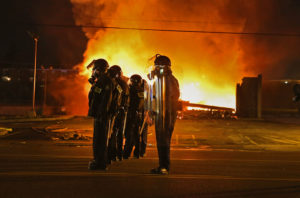Three decades ago, a conversation in one of my classes at the University of Tulsa turned to the topic of Ronald Reagan. “Can you believe he called the Soviet Union an evil empire?” a student remarked with evident scorn. To which a small voice from the back of the room replied: “Well, they were pretty evil.”
Even in the red state of Oklahoma, the American heartland and buckle of the Bible Belt, it took some courage to state the obvious in a university classroom when it offended conventional political pieties. But the students were always more sensible than the faculty.
I learned this shortly after 9/11, when I appeared on a university panel to discuss what was to be done. I told the packed room that we should hunt down the leaders of al-Qaeda and kill them. A professor who later received an appointment at a prestigious theological seminary immediately accused me of proposing to slaughter innocent people, the inevitable “collateral damage” of military action. After the panel, other, like-minded colleagues stopped speaking to me. But half a dozen students told me that they appreciated my comments, even though they didn’t share my views.
Some years later, the Muslim Students Association (MSA) invited a neo-Nazi from California to speak at one of their events. Leaders of the Tulsa Jewish community contacted me, but the university president refused to get involved. When one of the few Jewish students on campus told me that she was going to speak with the leader of the MSA, I assumed she would be rebuffed. Yet after their conversation, he agreed to cancel the event.
Those were the days. Progressive liberals have now given birth to a generation of demonic ideologues who excuse sheer evil. Reading the “Joint Statement by Harvard Palestine Solidarity Groups on the Situation in Palestine”, I can only hope that many Harvard faculty are appalled at the little monsters they’ve helped to create.
The statement, signed by 31 student organisations from Harvard College, the Divinity School, the Law School, the Medical School, and the Kennedy School of Government (including, incredibly, a group called “Harvard Jews for Liberation”), “hold[s] the Israeli regime entirely responsible for all unfolding violence”. That would include, as Victor Davis Hanson has written, “pulling Jewish elderly, women, and children out of their homes and executing them, and then throwing their bodies into the street” — atrocities last seen during the Holocaust.
The statement makes no mention of Hamas, the Iranian-funded Islamist terror group that is explicitly dedicated to the obliteration of Israel through Jihad. The Hamas Covenant includes the following language, from the hadith (sayings attributed to Mohammed): “The Day of Judgment will not come about until Moslems fight Jews and kill them. Then, the Jews will hide behind rocks and trees, and the rocks and trees will cry out: ‘O Moslem, there is a Jew hiding behind me, come and kill him.’”
Instead, the Harvard students characterise the Palestinians as hapless victims of “colonial retaliation”, academic cant as tiresome as it is crude. “In the coming days,” their statement asserts, “Palestinians will be forced to bear the full brunt of Israel’s violence.… Today, the Palestinian ordeal enters into uncharted territory.”
But the ordeal that the citizens of Israel are suffering is very well-charted. It is an ordeal perfected by the Nazis: violent cruelty that is meant simply to humiliate and defile, including what the Holocaust survivor Terrence des Pres called “excremental assault”. No one can watch this video of an Israeli woman, bruised and bloodied, her wrists tied with wire, her sweatpants soiled with feces (to beat the shit out of someone is a real thing), pulled out of the back of a Jeep by her hair, and not understand this fact. Have the Harvard students seen this video of men chanting “Allah hu Akbar!” while sitting on the naked corpse of Shani Louk? She was a tattoo artist and conscientious objector to Israel military service who was murdered and robbed at a music festival for peace. She could have been among their best friends.
For all their education and supposed intelligence, the signers of the Harvard Statement remind me of some unlettered Polish farmers Claude Lanzmann interviewed for his film Shoah. These men lived next to the Treblinka death camp, and although they did not (as one says) “speak Jew”, they knew what was going on. They saw the old men and women, the mothers with babies and children, dragged from the trains. They heard them scream as they were whipped down the chutes leading to the gas chambers. Asked how they felt about this, one replied, according to Lanzmann’s translator, “If I cut my finger, it doesn’t hurt him.” Another said: “You get used to anything.” Who says you have to attend an Ivy League school to learn moral relativism?
Lanzmann wonders how another Polish villager feels now that the Jews are gone. “How can I tell?” she asks in return. “I never went to school. I can only think of how I am now. Now I’m fine.” But the Harvard signatories did go to school, and they, too, are just fine.
Harvard remains the jewel in the crown of the American university system. Its graduates will enter the ranks of the elite and become leaders in government, law, business, and culture. Yet its most outspoken students are shamefully incapable of recognising pure evil when they see it. (Surely they see it—they have YouTube in Cambridge, don’t they?) As Yael Bar Tur has written, “I could be sitting in class with these students, watching children brutally murdered, raped, kidnapped and their mutilated bodies torn apart by a jeering crowd — and hear why it’s justified.”
Not coincidentally, Harvard just earned the worst score ever recorded in the Foundation for Individual Rights and Expression’s College Free Speech Rankings: -10.69, more than six standard deviations below the average. The nation’s premiere university appears to be an echo chamber of moral vacuousness and antisemitic ideology. More than a national scandal, the Joint Statement exposes the profound moral and intellectual rot at the heart of American higher education.
Disclaimer
Some of the posts we share are controversial and we do not necessarily agree with them in the whole extend. Sometimes we agree with the content or part of it but we do not agree with the narration or language. Nevertheless we find them somehow interesting, valuable and/or informative or we share them, because we strongly believe in freedom of speech, free press and journalism. We strongly encourage you to have a critical approach to all the content, do your own research and analysis to build your own opinion.
We would be glad to have your feedback.
Source: UnHerd Read the original article here: https://unherd.com/



